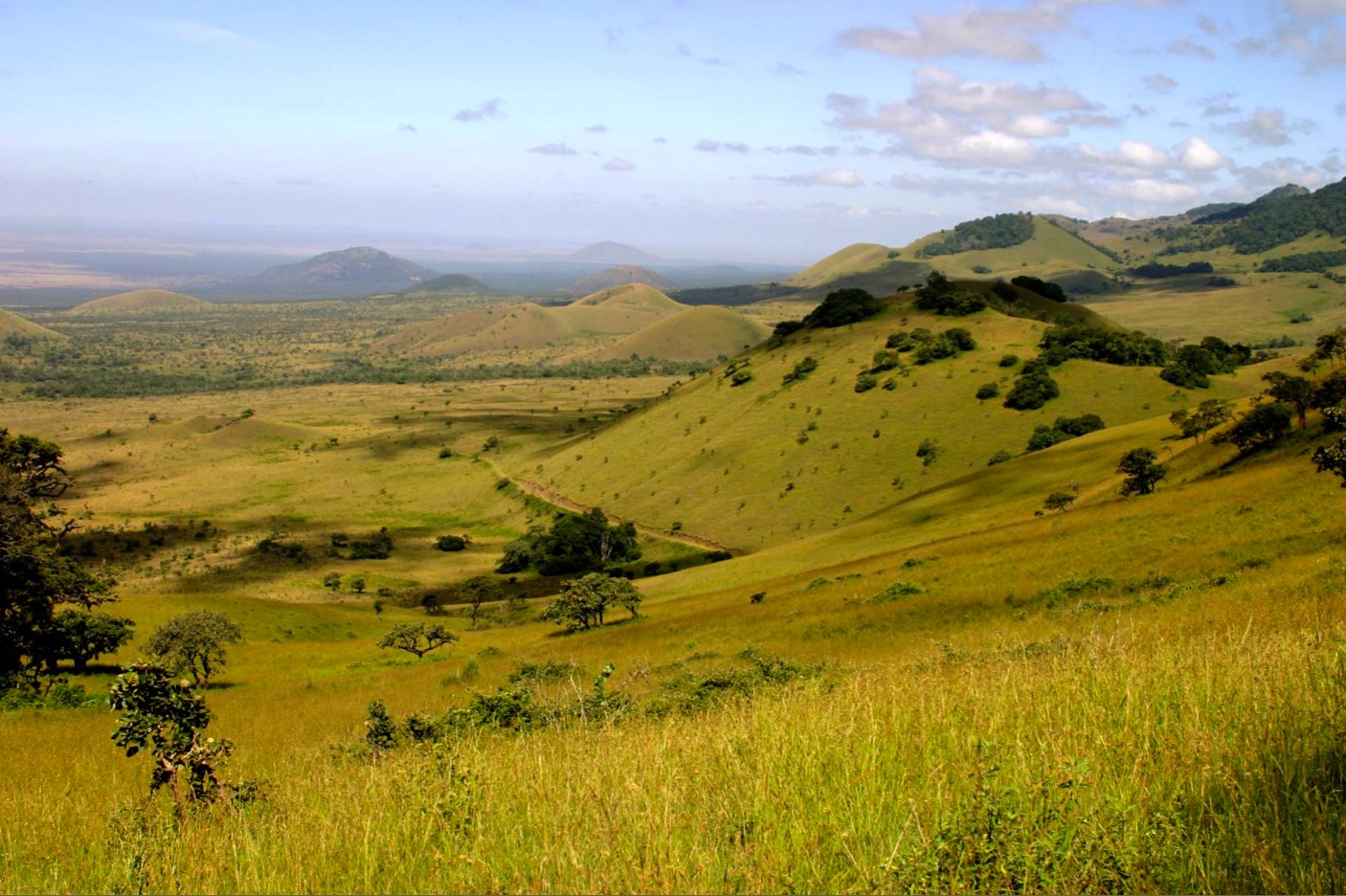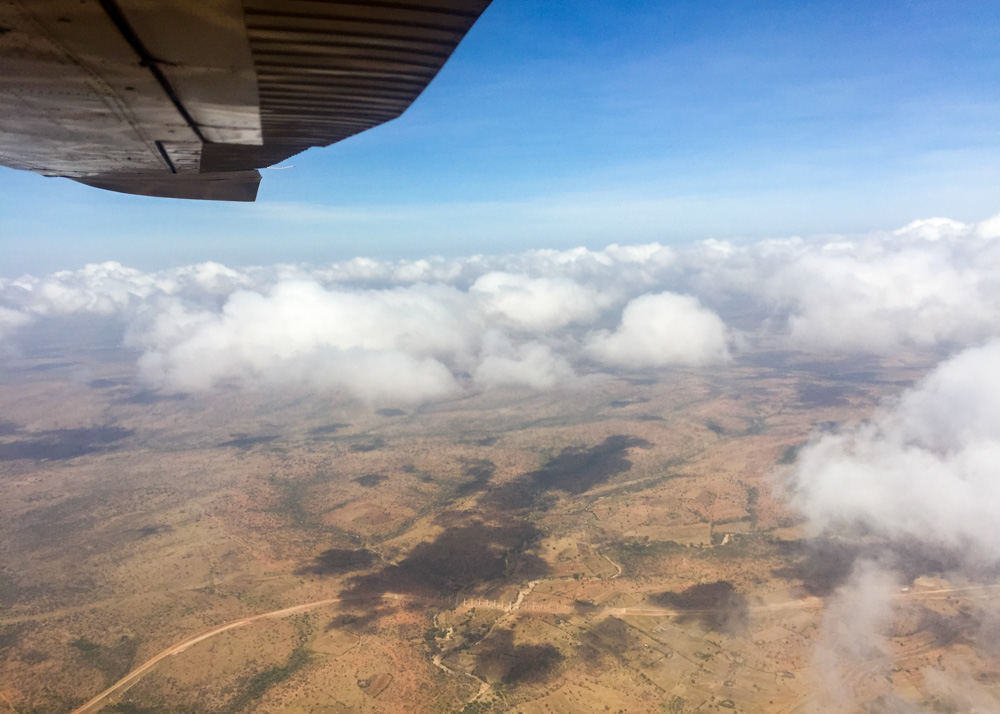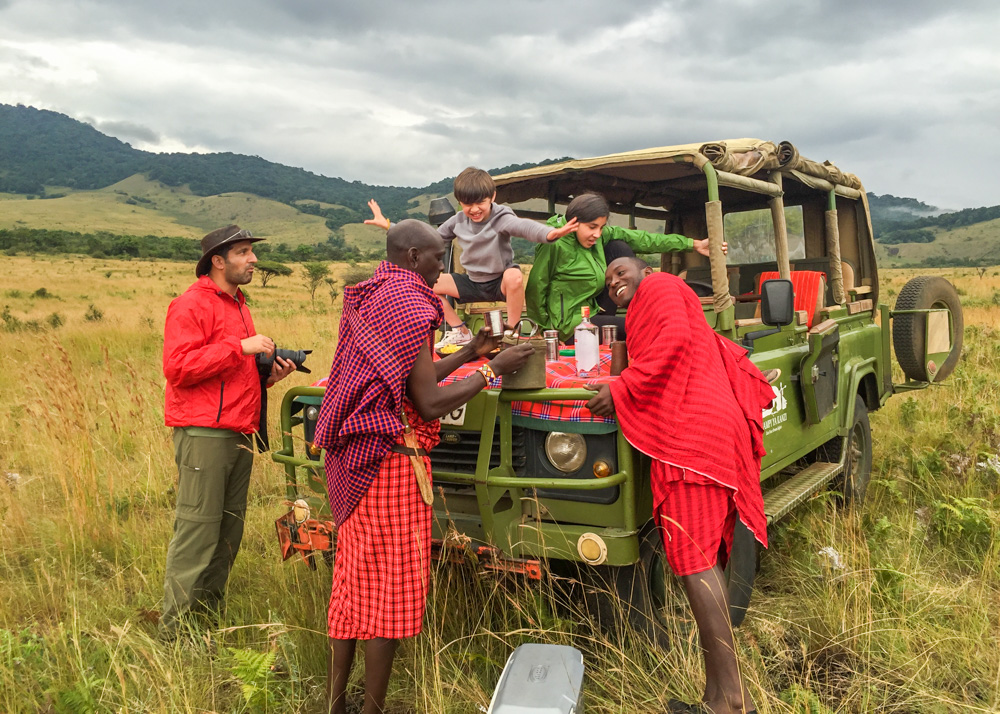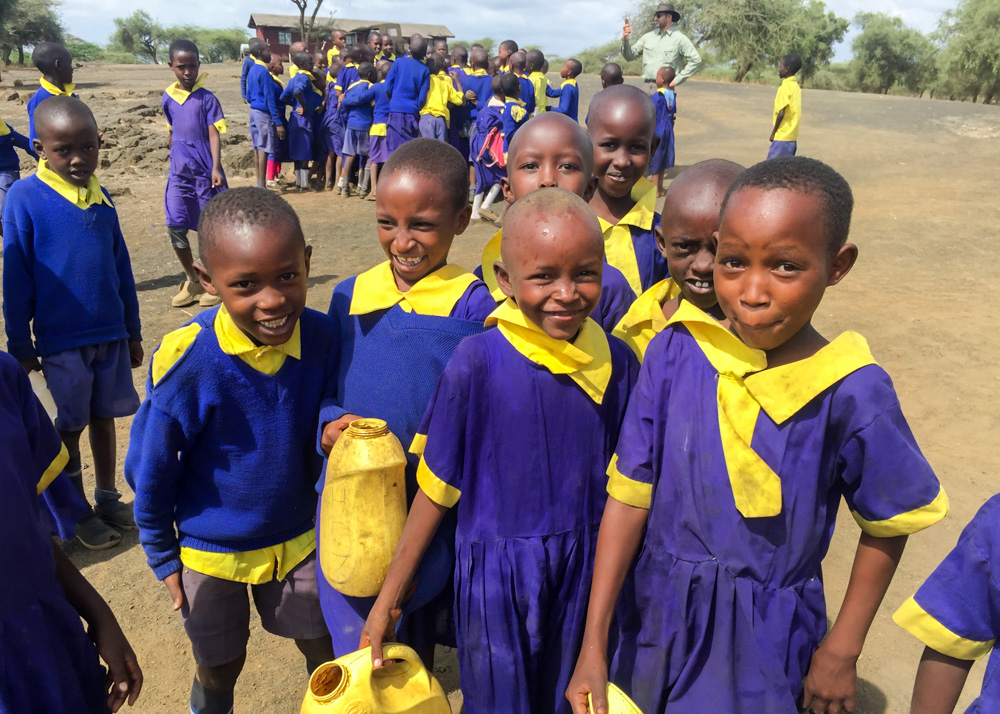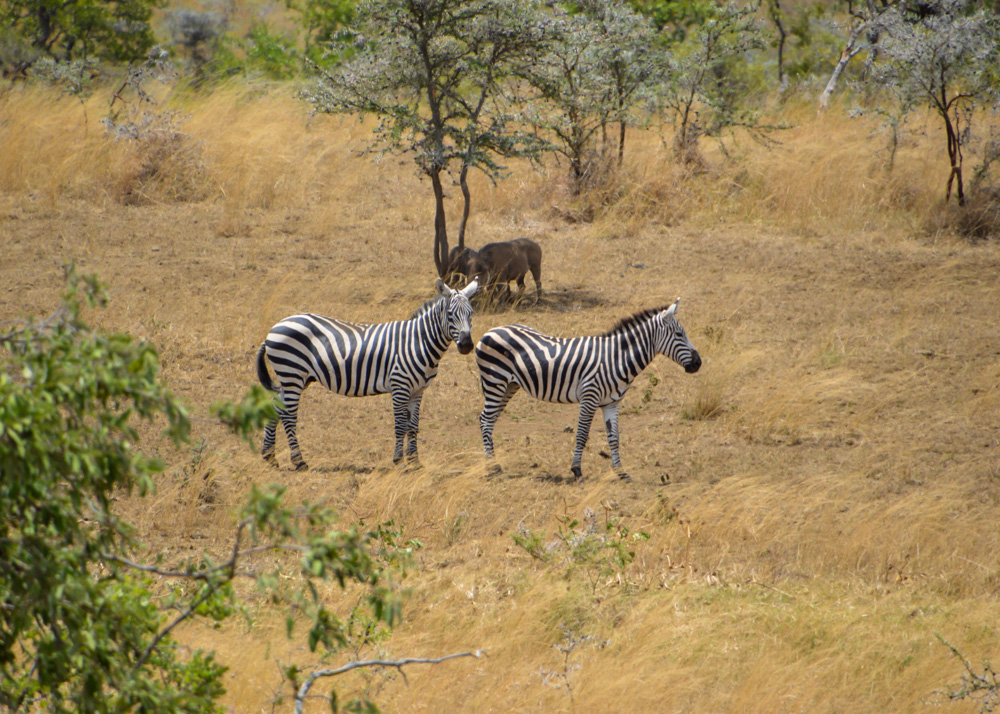By Stephanie Brownell, Elevate Traveler
The grass is as tall as it is dry. In a week, the rains will have started, and these Kenyan plains will dramatically transform, as will I, and the rest of my family. The heat of the day lingers, holding onto the late afternoon as we walk. Twenty or so impalas and Grant’s gazelles materialize. They take brief notice of us then return to grazing a few hundred yards away, unalarmed.
The grass is taller than my eight-year-old son, Ramsey, who walks single file in front of me, his steps following the slender, bare legs of two Maasai guides in the lead. I am close behind, followed by Nina, my twelve-year-old daughter, Ali, the father of my children and soon to be ex-husband, as well as another guide. We are on our first ever “sundowner”– a game drive, or in this case a hike, to a scenic spot to watch the sunset with snacks and drinks.
We cross a scrubby plain, trekking six kilometers to Longuido – a giant granite rock where baboons gather, at the edge of the Chyulu Hills. These are the famed, green hills of Africa, in Southern Kenya, where we will watch the sun set over Kilimanjaro.
Walking is tricky; we learn as we go. The terrain is unfamiliar, full of unexpected things. There are divets and crumbly rocks to navigate, and occasionally large bones to step around – a femur, a jaw, a cracked skull, and others I cannot identify – invisible in the overgrowth. It can only be felt, one footstep at a time.
I got it in my head to take my family on a trip to heal itself. It did not have to be Kenya, but I don’t believe in accidents. The desire came to me months before, to participate in a service project along with my two children and their father, Ali, with whom I was in the midst of divorce. The trip was my idea. The divorce was not.
***
That I almost didn’t make it, that I so nearly missed this adventure, is incredible. Three days before our departure date I could not find my passport. Anywhere. I riffled through the house, my usual stashes, through stacks of papers, articles, bills and scraps of the children’s artwork tucked in between. I considered options, cool deliberate sorting of scenarios in my head to quiet my anxious heart.
I could keep looking and hoping, or I could gather my documents and FedEx them to an expeditor in San Francisco and—if all went well—the passport would be delivered to me by 9:00 AM on Saturday morning. We were to leave for the airport at 11:00 AM. Close. I was confident my passport wasn’t to be found, but once I reported it lost, it wouldn’t be of any use to me even if I did find it. Tick tock. No margin for error. Plenty could go wrong, but I knew it could also go right. I filled out the forms.
In the background of all the domestic gestures I made over the next few days—continuing to pack, making dinner and arrangements, delivering the children to and from school and their lessons—I circled around the fact that I’d lost yet another version of my identity. I remembered holding my passport, freshly renewed and empty, savoring its stiff authority. Its absence shadowed me, like a panting giant at my back.
The children watched me closely; I smiled and kept moving. Panic would not help. It seemed impossible to me that the trip might crumble at the last moment by my own carelessness. I had to accept that I might devastate my children again. In the waiting, I talked to them – as much as myself – about how life is full of unexpected things, but we just breathe deeply, adjust and keep going toward the goal. Surprisingly, I stumbled upon great peace while navigating that uncertainty and found a way to believe in the possible, not because everything always worked but because it could. And it did.
***
A few days and thousands of miles away, we arrived in Chyulu on a chartered Cesna after visiting the David Sheldrick Wildlife Trust and Karen Blixen’s farm at the foot of the Ngong Hills. From the little plane our eyes took in the textured brown and green shades of East Africa, admiring the yelping herds of zebra, loping giraffe, and the scurry of warthogs. Soaring over the Great Rift Valley, I thought about the first steps of our species and filled up with a sense of humility and awe that transcended the confusion of the past year.
While there were many things in which we were not in agreement, Ali and I shared a love of nature, travel, and seeing the world. I felt immeasurable gratitude to Ali for agreeing to and supporting the trip; we showed up together to help our children “look up” and delve into other ways of being in the world. We settled into a camp that specializes in eco-safaris – a conservancy on 283,000 acres of protected land, managed by a partnership between the Maasai of the Kuku Ranch Group and an Italian ex-pat.
We’d brought donations for distribution to a school and clinic run by the conservancy, and arranged to volunteer at one of the schools. We planned to take a group of children on their first field trip, a visit to Tsavo West National Park, as part of the “Buy A Trip, Give A Trip” program that allows local children to experience the natural treasures of their own country.
Our first stop inside the park was at Shetani, a dark rippled crust of lava and nothing else. The Shetani lava flow is barren because it is only a few hundred years old. We fidgeted on the rocks then stilled to listen to our guide, drawn to the cycle of transformation after eruptions and the interdependence of ecosystems. Over time, life would be coaxed back, filling the crevices and nooks. The story plays out over the more than 9,000 square kilometers of Tsavo West; our field trip traversed the evolution.
At an outcrop of lush vegetation called Mzima Springs, we marveled at the massive hippos soaking, plunging, and bubbling. Legions of birds in every size and color dotted the scraggy savannah leading to the fantastic spectacle of wildlife gathering at the watering hole. There is almost a struggle to accept the naturalness of it, as though it must have been choreographed, but the experience is enveloping. It is both exhilarating and grounding.
Giraffes bend to drink, legs at awkward angles. Zebras, dusty with the distinctive, red clay of Tsavo, approach on their stiff and sturdy legs as though they’ve just come from a mud run. Massive Cape buffalo move in slowly from the distance, ox-peckers perched on their backs. Baboons scamper in the mid-ground. Antelopes appear in all sizes, from the tiny dik dik – the size of whippets – to impala, gazelle, and the mighty eland. A herd of elephants (twenty in all!) wade into the water, scattering the Egyptian geese. A martial eagle rests in the top branch of a baobab tree. There is, of course, more beauty and complexity than can be seen or understood, but I feel the majestic unity reaching inside me.
I wonder if it’s the same for the Kenyans. Though the children on our field trip live between four and sixty kilometers from Tsavo , many species can only be found within strictly protected perimeters. Travel is difficult and prohibitively expensive for most, as are park fees. Do local families see zebras and lilac-breasted rollers and elephants and giraffes regularly? Several children were fascinated with a grounded airplane near the lodge; others enjoyed eating new foods, discovering new customs, tools, and western-style plumbing, and even visiting the national park at all. What will they take away from today?
The end of my fourteen-year marriage and my family as it I knew it came as a shock. It’s difficult to know for certain if it could have been avoided but, after much reflection, I don’t think so; it was destined to fall apart from the beginning. In the fairytale of our romance, I felt fervently that we were destined for something great, but I never imagined the greatest greatness might be grief.
I was determined to find a healthier relationship with my former spouse and a happier family for our kids. I reached to show them how wonder and beauty could be found in an unfamiliar world, and to restore their confidence in who they were and that their parents would work together for their benefit. I wanted them to understand that their family is different in some ways than it was, but it is strong, stronger even in new ways, and so are they.
***
On the bush walk, daylight was fading, and a gentle wind weaved through us on our way to the baboon mountain. The grasses rustled with the preciousness of life, each moment’s potential to continue as well as the connection to the past, however unknown or unlikely. There was only a short way left to the vantage point, and the path was fainter now – eroded, uneven and windblown. These were the migration routes of small-hoofed animals – which we were not.
Twisted branches of stubby acacia bushes studded with wicked thorns snagged our clothing and punctured our skin, leaving stinging reddened scratches and embedding in my son’s tender skin. The guides glided through wearing minimal tunics made of blood-red Maasai cloth, immune to the biting brush. We zig-zagged up the last sharp vertical and arrived at the flattened summit. We sat on a colorful blanket laid with small wooden bowls of crisps and biscuits and passed cups around with drinks.
The valley was laid out below, and the sky loomed above and all around. Before us the sun was immense, quivering on the horizon, red and orange, before it stole away to the other side of the world, undiminished. Transition is not always so peaceful as that moment, but there can be such beauty in the transformation and wonder in the process. From here, we lean in and learn. From here, we heal.
Stephanie Brownell lives and writes in Seattle with her two children and two Rhodesian Ridgebacks. She is working on a book of non-fiction. Stephanie planned the trip to Kenya after researching philanthropic and adventure travel, which led her to discover Elevate Destinations, an eco-travel company of distinction. She and her children can’t wait to return to Kenya.
